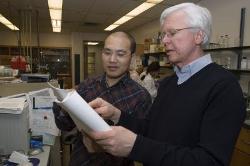Apr 3 2010
The Ohio Third Frontier Commission has approved a $1,127,873 award to Yellow Springs-based YSI Inc., Riehl Engineering and the University of Cincinnati for their "Advanced Modified Carbon Nanotube-Based Nutrient Sensor" project.
 As part of the project, a Raman microscope worth more than a quarter of a million dollars will be purchased for the UC Sensor Instrumentation Laboratory
As part of the project, a Raman microscope worth more than a quarter of a million dollars will be purchased for the UC Sensor Instrumentation Laboratory
University of Cincinnati Distinguished Research Professor William Heineman, in the McMicken College of Arts & Sciences, Department of Chemistry, is officially part of the million-dollar team.
The project will produce an advanced nutrient sensor to enable critical monitoring of environmental waters for nitrate, which is a major pollutant associated with wastewaters and agricultural runoffs. Sensors are devices used to collect information about an environment, either remotely or by being located in the area being studied.
"The carbon nanotube-based sensor will be able to measure the nitrate in an extremely fast, sensitive way," explains Heineman. "The sensor will be a superior method of providing environmental quality control."
Nitrate is a chemical compound commonly found in fertilizers and formed by microbes that break down nitrogen-bearing plant residues in the soil. Storm water runoff washes these nitrates into streams and rivers. Nitrate, being a nutrient, feeds algae and other plants in the water. Too much nitrate causes growth surges, thus choking out the fish and other animals.
Nitrates that might be entering a community's drinking water must be monitored by industries as mandated by several requirements and regulations, such as National Pollutant Discharge Elimination System permits under the Clean Water Act, the Safe Drinking Water Act, and the Emergency Planning and Community Right to Know Act. Up until now, such monitoring has been cumbersome, with sensors being approximately the size of a 45-gallon can and weighing about 80 pounds.
Thanks to the work of the team, the new sensors that are currently in development will be about one-third the size of a pencil, and will fit in a "smart probe" that is about the size of a AA flashlight. The team believes that this sensor will encourage many more industries — and perhaps even individuals — to monitor their runoff.
"Once you can do it, people will do it more," says Kevin Schlueter, YSI's program manager for the project. "A lot of companies have been asking for something like this."
As part of the project, a Raman microscope worth more than a quarter of a million dollars will be purchased for the UC Sensor Instrumentation Laboratory. One UC graduate student will also be funded to work on this project.
"There will be a dual benefit," explains Heineman. "YSI will be able to use the instrument and my students and I will be able to use it as well."
There is a definite positive synergy to the project, Heineman notes.
"YSI wants products — I want projects for my PhD students. My job is to generate relevant research projects so that the students can learn how to do research. This grant enables them to help develop a sensor they wouldn't have ordinarily have had access to," he says. "An added benefit is the opportunity for my students to learn about industry by 'rubbing elbows' with YSI scientists working on this project."
UC chemistry has played a large role in the development of this particular product.
YSI's Schlueter earned his PhD in Chemistry at UC while studying under Brian Halsall and he did his post-doctoral research under Heineman and Halsall. YSI Biosensor Technologies Director Jay Johnson is also a PhD graduate of UC's Chemistry Department and a former student of Heineman's.
Ed King, Vice President of Research for YSI, did not go to UC, but he is another Ohio product, having graduated from Ohio Northern University.
"This is a good Ohio story," King says. "Through the Third Frontier Grants, we're proliferating goodwill and jobs throughout Ohio."
Besides being of benefit to the communities of Ohio, the Ohio Third Frontier Grants also support education and further business development in Ohio.
Source: http://www.uc.edu/news/